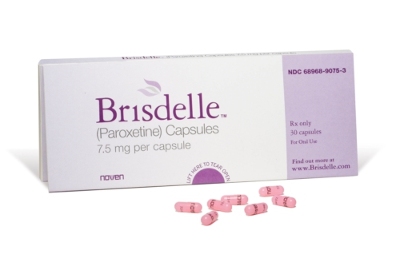
The first nonhormonal drug for hot flashes associated with menopause was approved by the US Food and Drug Administration (FDA) today despite an agency advisory committee having rejected it as too much risk for minimal benefit.
The drug is paroxetine mesylate (Brisdelle, Noven Therapeutics). Paroxetine, a serotonin reuptake inhibitor, is the active ingredient in 2 drugs for depression and other psychiatric disorders, Paxil (GlaxoSmithKline) and Pexeva(Noven Therapeutics). Both drugs contain higher doses of paroxetine than the version for hot flashes.
In March, the FDA's Advisory Committee for Reproductive Health Drugs voted 10 to 4 against recommending approval of paroxetine mesylate as a treatment for hot flashes. Critics said the drug's minimal superiority to a placebo did not outweigh the risk for suicide ideation and osteoporosis, 2 adverse events associated with paroxetine.
At the same time, the committee also voted 12 to 2 not to recommend another nonhormonal candidate for hot flash therapy. This one was gabapentin (Sefelsa, Depomed), which has been already approved as an anticonvulsant (Neurontin, Pfizer; Gralise, Depomed). The majority verdict was that in light of its adverse affect on cognition and other aspects of the central nervous system, the drug's limited efficacy in controlling hot flashes was not very convincing. On June 1, Depomed announced that the FDA had declined to approve its drug.
The FDA is not obliged to follow the advice of its advisory committees, but as in the case of gabapentin, it usually does.
In a news release, the agency seemed to explain why it overrode the recommendation of its advisory committee when it came to paroxetine mesylate.
"There are a significant number of women who suffer from hot flashes associated with menopause and who cannot or do not want to use hormonal treatments," said Hylton Joffe, MD, director of the Division of Bone, Reproductive and Urologic Products in the FDA's Center for Drug Evaluation and Research.
The FDA stated in the news release that paroxetine mesylate proved safe and effective in 2 clinical trials involving 1175 postmenopausal women with moderate to severe hot flashes. Headache, fatigue, nausea, and vomiting were the most common adverse events observed in patients.
The drug's label features a boxed warning about the increased risk for suicidality. The label also warns clinicians that paroxetine mesylate can reduce the effectiveness of the breast cancer drug tamoxifen if taken together, increase the risk for bleeding, and comes with the risk for serotonin syndrome.
More information on today's approval of paroxetine mesylate is available on the FDA Web site.





 留言列表
留言列表
 線上藥物查詢
線上藥物查詢 